新目标浙江中考英语二轮复习语法篇--非谓语动词(共32张PPT)
文档属性
| 名称 | 新目标浙江中考英语二轮复习语法篇--非谓语动词(共32张PPT) |

|
|
| 格式 | pptx | ||
| 文件大小 | 2.4MB | ||
| 资源类型 | 试卷 | ||
| 版本资源 | 人教新目标(Go for it)版 | ||
| 科目 | 英语 | ||
| 更新时间 | 2021-05-25 00:00:00 | ||
图片预览

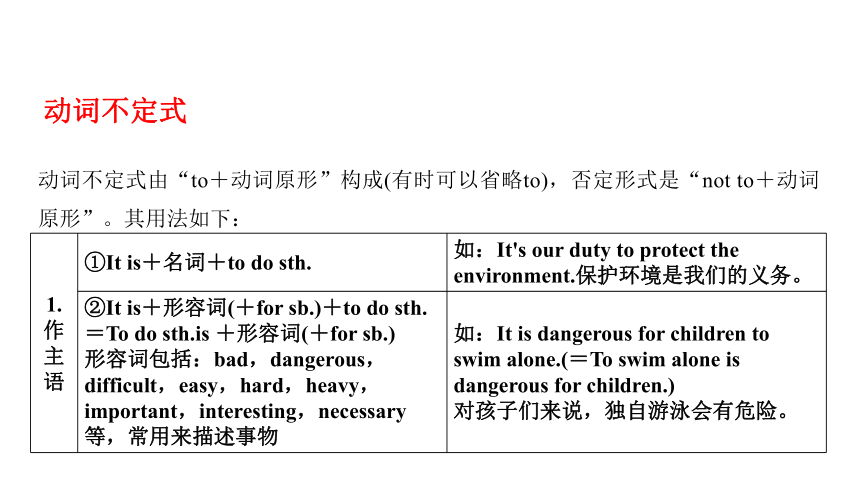
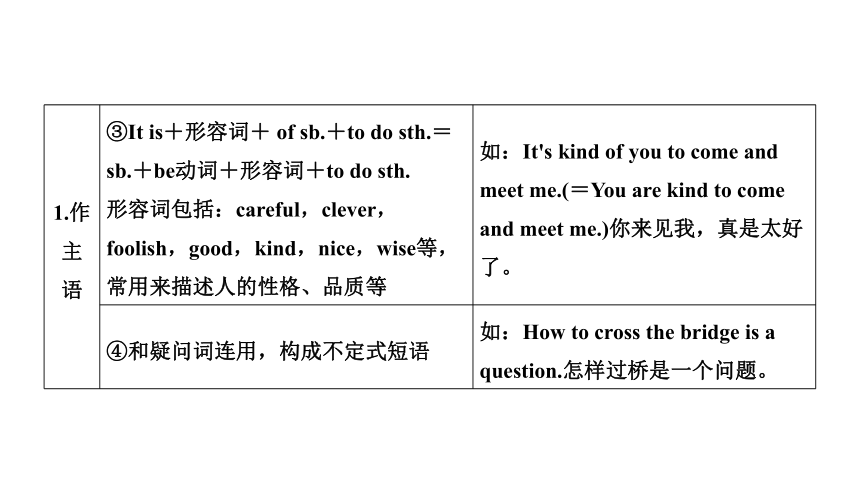
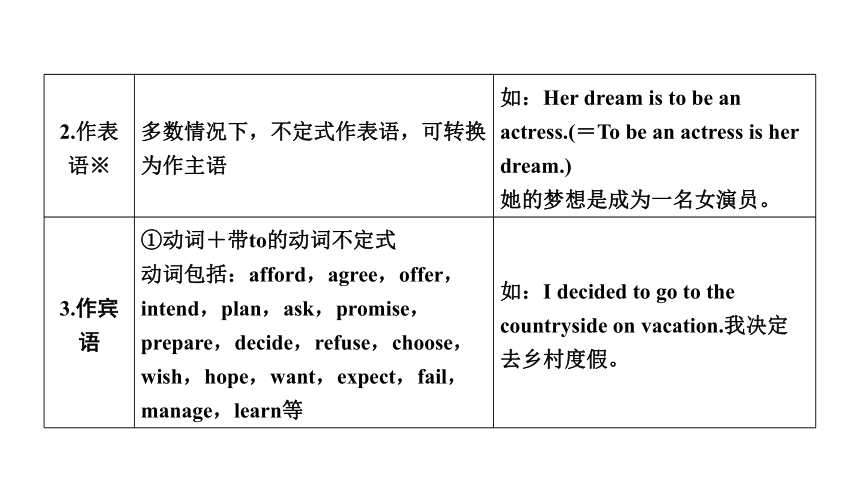
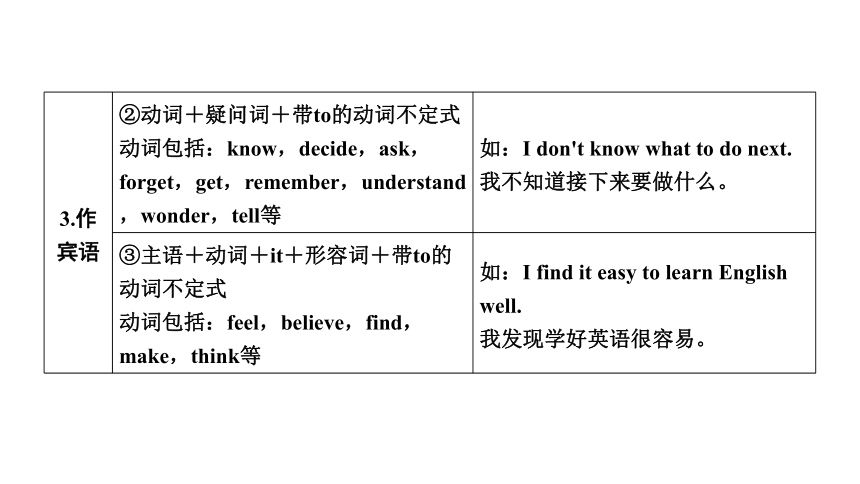
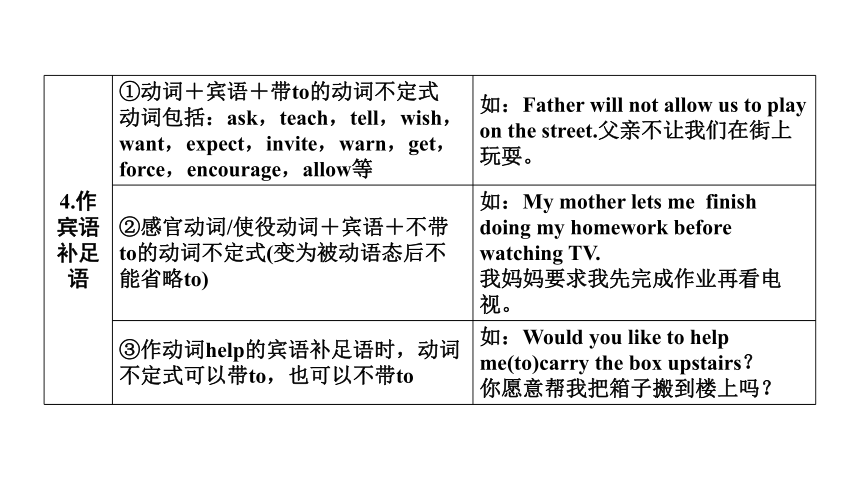


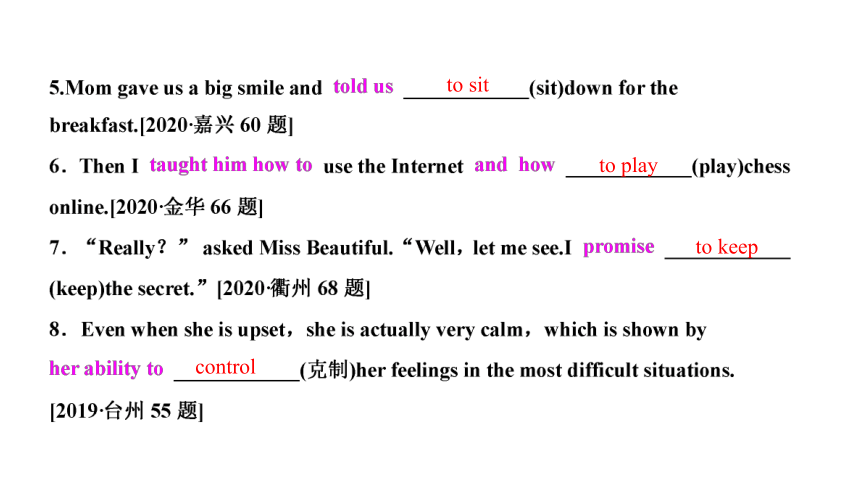
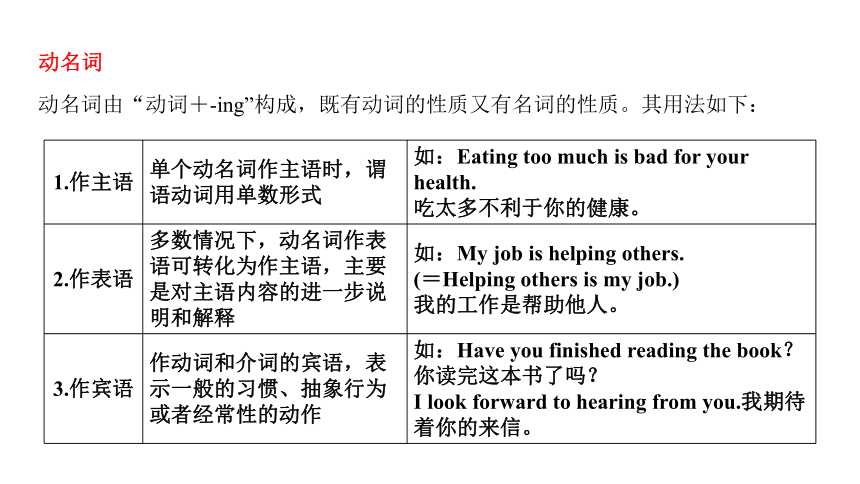
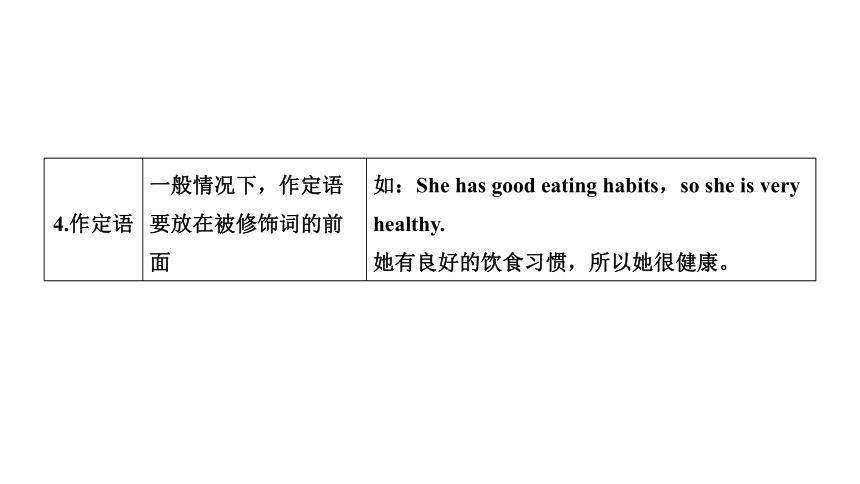
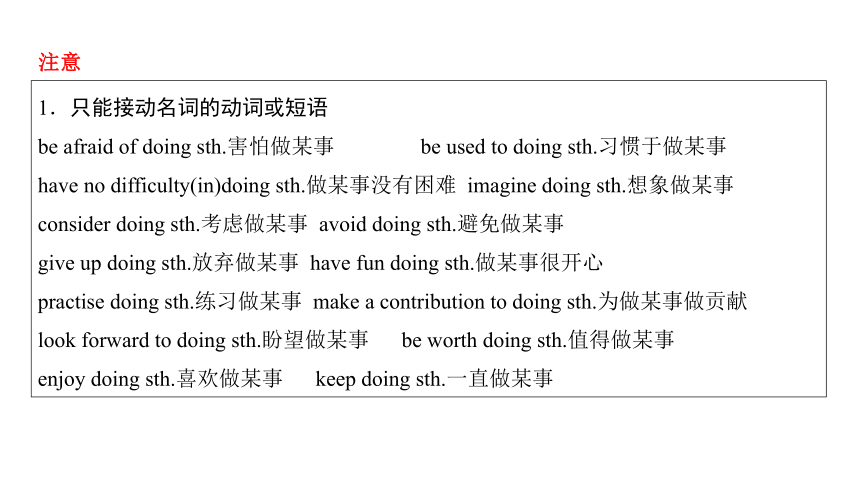
文档简介
中考二轮复习
语法篇
非谓语动词
动词不定式由“to+动词原形”构成(有时可以省略to),否定形式是“not to+动词原形”。其用法如下:
1.作主语
①It is+名词+to do sth.
如:It's our duty to protect the environment.保护环境是我们的义务。
②It is+形容词(+for sb.)+to do sth.=To do sth.is +形容词(+for sb.)
形容词包括:bad,dangerous,difficult,easy,hard,heavy,important,interesting,necessary
等,常用来描述事物
如:It is dangerous for children to swim alone.(=To swim alone is dangerous for children.)
对孩子们来说,独自游泳会有危险。
动词不定式
1.作主语
③It is+形容词+ of sb.+to do sth.=sb.+be动词+形容词+to do sth.
形容词包括:careful,clever,
foolish,good,kind,nice,wise等,常用来描述人的性格、品质等
如:It's kind of you to come and meet me.(=You are kind to come and meet me.)你来见我,真是太好了。
④和疑问词连用,构成不定式短语
如:How to cross the bridge is a question.怎样过桥是一个问题。
2.作表语※
多数情况下,不定式作表语,可转换为作主语
如:Her dream is to be an actress.(=To be an actress is her dream.)
她的梦想是成为一名女演员。
3.作宾语
①动词+带to的动词不定式
动词包括:afford,agree,offer,intend,plan,ask,promise,prepare,decide,refuse,choose,wish,hope,want,expect,fail,manage,learn等
如:I decided to go to the countryside on vacation.我决定去乡村度假。
3.作宾语
②动词+疑问词+带to的动词不定式
动词包括:know,decide,ask,forget,get,remember,understand,wonder,tell等
如:I don't know what to do next.
我不知道接下来要做什么。
③主语+动词+it+形容词+带to的动词不定式
动词包括:feel,believe,find,make,think等
如:I find it easy to learn English well.
我发现学好英语很容易。
4.作宾语补足语
①动词+宾语+带to的动词不定式
动词包括:ask,teach,tell,wish,want,expect,invite,warn,get,force,encourage,allow等
如:Father will not allow us to play on the street.父亲不让我们在街上玩耍。
②感官动词/使役动词+宾语+不带to的动词不定式(变为被动语态后不能省略to)
如:My mother lets me finish doing my homework before watching TV.
我妈妈要求我先完成作业再看电
视。
③作动词help的宾语补足语时,动词不定式可以带to,也可以不带to
如:Would you like to help me(to)carry the box upstairs?
你愿意帮我把箱子搬到楼上吗?
5.作定语
①不定式一般要放在被修饰词的后面
如:In my dreams,I always have very difficult jobs to do.
在梦里,我总是有非常艰苦的工作要做。
②如果不定式含不及物动
词,后面要跟相应的介词
如:Little Tom found no one to play with.小汤姆找不到人和他玩耍。
6.作状语
①表目的
如:He worked day and night to earn money.为了赚钱,他日夜工作。
②表结果
如:It's too heavy to carry.它太重了,搬不动。
③表原因
如:They were very sad to hear the news.听到这个消息,他们非常伤心。
avoid
win
try
to study
to sit
to play
to keep
control
动名词由“动词+?ing”构成,既有动词的性质又有名词的性质。其用法如下:
1.作主语
单个动名词作主语时,谓语动词用单数形式
如:Eating too much is bad for your health.
吃太多不利于你的健康。
2.作表语
多数情况下,动名词作表语可转化为作主语,主要是对主语内容的进一步说明和解释
如:My job is helping others.
(=Helping others is my job.)
我的工作是帮助他人。
3.作宾语
作动词和介词的宾语,表示一般的习惯、抽象行为或者经常性的动作
如:Have you finished reading the book?
你读完这本书了吗?
I look forward to hearing from you.我期待着你的来信。
动名词
4.作定语
一般情况下,作定语要放在被修饰词的前面
如:She has good eating habits,so she is very healthy.
她有良好的饮食习惯,所以她很健康。
1.只能接动名词的动词或短语
be afraid of doing sth.害怕做某事 be used to doing sth.习惯于做某事
have no difficulty(in)doing sth.做某事没有困难 imagine doing sth.想象做某事
consider doing sth.考虑做某事 avoid doing sth.避免做某事
give up doing sth.放弃做某事 have fun doing sth.做某事很开心
practise doing sth.练习做某事 make a contribution to doing sth.为做某事做贡献
look forward to doing sth.盼望做某事 be worth doing sth.值得做某事
enjoy doing sth.喜欢做某事 keep doing sth.一直做某事
注意
suggest doing sth.建议做某事 finish doing sth.做完某事
feel like doing sth.想要做某事 spend time(in)doing sth.花费时间做某事
can't help doing sth.情不自禁做某事 mind doing sth.介意做某事
miss doing sth.错过做某事
2.既可接不定式又可接动名词的动词
remember doing sth.记得做过某事 remember to do sth.记得去做某事(未做)
forget doing sth.忘了做过某事 forget to do sth.忘了去做某事(未做)
regret doing sth.后悔做过某事 regret to do sth.遗憾要做某事(即将去做)
stop doing sth.停止做某事 stop to do sth.停下来去做另外一件事
try doing sth.尝试做某事 try to do sth.尽力做某事
go on doing sth.继续不停地做某事 go on to do sth.(做完一件事)接着去做另外一件事
watching
eating
talking
seeing
to clean/cleaning
cleaning
working
speaking
smiling
现在分词v.?ing表示动作正在发生,为主动意义;过去分词v.?ed表示动作已经完成,含有被动意义。
1.作定语
单个分词作定语,通常放在被修饰词的前面;分词短语作定语,通常放在被修饰词的后面
如:We only sell used books.我们只卖用过的书。
The bridge built last month needs repairing.
上个月建造的那座桥需要修缮。
2.作表语
现在分词作表语,表示主语的性质、特征等;过去分词作表语,表示某种状态
如:Paper cutting is interesting.I'm interested in it.
剪纸很有趣,我对它很感兴趣。
分词
3.作状语
现在分词作状语,表示主动或动作正在进行;过去分词作状语,表示被动或动作已经完成
如:Laughing and talking,they went into the park.
他们有说有笑地走进了公园。
Grown in rich soil,these seeds grow fast.
种在肥沃的土壤里,这些种子长得很快。
4.作宾语补足语
分词作宾语补足语,常用在感官动词或使役动词后;现在分词表示主动或动作正在进行,过去分词表示被动或动作已经完成
如:I heard a girl singing in English.
我听到一个女孩在用英语唱歌。
I'll have my hair cut tomorrow.明天我要理发。
influenced
was stolen
invented
lying
动词变形容词
一、动词+?ful
1.thank→____________ 感激的
2.regret→____________ 遗憾的
3.wonder→____________ 极好的
二、a?+动词
1.live→____________ 活着的
2.sleep→____________ 睡着的
3.wake→____________ 醒着的
thankful
regretful
wonderful
alive
asleep
awake
动词转化
三、动词+?able(含双写最后一个字母/去?e)
1.believe→____________ 可信的
2.enjoy→____________ 令人愉快的
3.forget→____________ 容易遗忘的
四、动词+?ing/?ed(含去?e)
1.amaze→____________/____________ 令人惊奇的/吃惊的
2.bore→____________/____________ 无聊的/感到无聊的
3.excite→____________/____________ 令人兴奋的/兴奋的
4.frighten→____________/____________ 使惊恐的/受惊吓的
5.interest→____________/____________ 有趣的/感兴趣的
believable
enjoyable
forgettable
amazing
amazed
boring
bored
exciting
excited
frightening
frightened
interesting
interested
6.relax→____________/____________ 使人轻松的/放松的
7.surprise→____________/____________ 令人吃惊的/感到惊讶的
8.tire→____________/____________ 累人的/累的
9.satisfy→____________/____________ 令人满意的/感到满意的
10.worry→____________/____________ 使人烦恼的/担心的
11.follow→____________ 接着的
relaxing
relaxed
surprising
surprised
tiring
tired
satisfying
satisfied
worrying
worried
following
五、其他
1.die→____________ 死的
2.act→____________ 活跃的
3.like→____________ 可能的
4.create→____________ 创造性的
5.live→____________ 生气勃勃的
6.break→____________ 碎的
dead
active
likely
creative
lively
broken
动词变名词
六、动词+?ment
1.achieve→____________ 成就 2.arrange→____________ 安排
3.develop→____________ 发展 4.move→____________ 移动
5.encourage→______________ 鼓励 6.punish→____________ 处罚
7.improve→______________ 改善 8.treat→____________ 处理
9.agree→____________ 协议 10.excite→____________ 激动
11.advertise→_______________ 广告
achievement
arrangement
development
movement
encouragement
punishment
improvement
treatment
agreement
excitement
advertisement
七、动词+?er/?or/?r(含双写最后一个字母)
1.act→____________(男)演员 2.drive→____________ 司机
3.design→____________ 设计者 4.work→____________ 工人
5.direct→____________ 导演 6.write→____________ 作家
7.invent→____________ 发明者 8.win→____________ 获胜者
9.lead→____________ 领导 10.own→____________ 拥有者
11.play→____________ 运动员 12.manage→____________ 经理
13.report→____________ 记者 14.make→____________ 生产者
actor
driver
designer
worker
director
writer
inventor
winner
leader
owner
player
manager
reporter
maker
15.run→____________ 跑步者 16.dance→____________ 舞者
17.speak→____________ 演讲者 18.hunt→____________ 猎人
19.teach→____________ 教师 20.organize→____________ 组织者
21.visit→____________ 参观者 22.perform→____________ 表演者
23.print→____________ 打印机 24.produce→____________ 生产者
25.read→____________ 读者 26.record→____________ 录音机
27.sing→____________ 歌手 28.travel→____________ 旅行者
29.wait→____________ 服务员 30.swim→____________ 游泳者
31.rob→____________ 强盗
runner
dancer
speaker
hunter
teacher
organizer
visitor
performer
printer
producer
reader
recorder
singer
traveler
waiter
swimmer
robber
八、动词+?(t)ion(含去?e)
1.collect→____________ 收集物 2.educate→____________ 教育
3.communicate→________________ 交流 4.operate→____________ 手术
5.connect→____________ 连接 6.instruct→____________ 指导
7.direct→____________ 方向 8.invent→____________ 发明
9.discuss→____________ 讨论 10.suggest→____________ 建议
11.introduce→____________ 介绍 12.pollute→____________ 污染
13.protect→____________ 保护 14.celebrate→____________ 庆祝
15.congratulate→______________ 祝贺
collection
education
communication
operation
connection
instruction
direction
invention
discussion
suggestion
introduction
pollution
protection
celebration
congratulation
九、动词+?ing(含双写最后一个字母/去?e)
1.begin→____________ 开端 2.swim→____________ 游泳
3.build→____________ 建筑物 4.cross→____________ 十字路口
5.cook→____________ 烹饪 6.turn→____________ 转弯处
7.end→____________ 结局 8.warn→____________ 警告
9.feel→____________ 感觉 10.spell→____________ 拼法
11.mean→____________ 意思 12.read→____________ 阅读
13.meet→____________ 会议 14.greet→____________ 招呼
15.paint→____________ 绘画 16.train→____________ 训练
17.say→____________ 谚语 18.write→____________ 写作
beginning
swimming
building
crossing
cooking
turning
ending
warning
feeling
spelling
meaning
reading
meeting
greeting
painting
training
saying
writing
十、动词+?ress
1.act→____________ 女演员 2.wait→____________ 女服务员
十一、其他
1.advise→____________ 建议 2.breathe→____________ 呼吸
3.die→____________ 死 4.grow→____________ 生长
5.discover→____________ 发觉 6.arrive→____________ 到达
7.fail→____________ 失败 8.choose→____________ 选择
9.laugh→____________ 笑声 10.enter→____________ 入口
11.serve→____________ 服务 12.marry→____________ 婚姻
13.succeed→____________ 成功 14.perform→_______________ 表演
15.think→____________ 想法
actress
waitress
advice
breath
death
growth
discovery
arrival
failure
choice
laughter
entrance
service
marriage
success
performance
thought
16.weigh→____________ 重量 17.fly→____________ 航班
18.know→____________ 知识 19.please→____________ 愉快
20.produce→____________ 产品 21.speak→____________ 演讲
22.sit→____________ 座位 23.tour→____________ 游客
weight
flight
knowledge
pleasure
product
speech
seat
tourist
1.The boy's parents were very ____________(thank)to the policeman because of his help.
2.His sudden ____________(die)made us very sad.
3.Edison was a great American ____________(invent).
4.What a ____________ lesson!I really get ____________ with it.(bore)
5.Foreign friends are amazed at the ____________(develop)of China.
6.Tony, tell me the result of the ____________(discuss)which you had with your dad yesterday.
thankful
death
inventor
boring
bored
development
discussion
跟踪练习
https://www.21cnjy.com/help/help_extract.php
语法篇
非谓语动词
动词不定式由“to+动词原形”构成(有时可以省略to),否定形式是“not to+动词原形”。其用法如下:
1.作主语
①It is+名词+to do sth.
如:It's our duty to protect the environment.保护环境是我们的义务。
②It is+形容词(+for sb.)+to do sth.=To do sth.is +形容词(+for sb.)
形容词包括:bad,dangerous,difficult,easy,hard,heavy,important,interesting,necessary
等,常用来描述事物
如:It is dangerous for children to swim alone.(=To swim alone is dangerous for children.)
对孩子们来说,独自游泳会有危险。
动词不定式
1.作主语
③It is+形容词+ of sb.+to do sth.=sb.+be动词+形容词+to do sth.
形容词包括:careful,clever,
foolish,good,kind,nice,wise等,常用来描述人的性格、品质等
如:It's kind of you to come and meet me.(=You are kind to come and meet me.)你来见我,真是太好了。
④和疑问词连用,构成不定式短语
如:How to cross the bridge is a question.怎样过桥是一个问题。
2.作表语※
多数情况下,不定式作表语,可转换为作主语
如:Her dream is to be an actress.(=To be an actress is her dream.)
她的梦想是成为一名女演员。
3.作宾语
①动词+带to的动词不定式
动词包括:afford,agree,offer,intend,plan,ask,promise,prepare,decide,refuse,choose,wish,hope,want,expect,fail,manage,learn等
如:I decided to go to the countryside on vacation.我决定去乡村度假。
3.作宾语
②动词+疑问词+带to的动词不定式
动词包括:know,decide,ask,forget,get,remember,understand,wonder,tell等
如:I don't know what to do next.
我不知道接下来要做什么。
③主语+动词+it+形容词+带to的动词不定式
动词包括:feel,believe,find,make,think等
如:I find it easy to learn English well.
我发现学好英语很容易。
4.作宾语补足语
①动词+宾语+带to的动词不定式
动词包括:ask,teach,tell,wish,want,expect,invite,warn,get,force,encourage,allow等
如:Father will not allow us to play on the street.父亲不让我们在街上玩耍。
②感官动词/使役动词+宾语+不带to的动词不定式(变为被动语态后不能省略to)
如:My mother lets me finish doing my homework before watching TV.
我妈妈要求我先完成作业再看电
视。
③作动词help的宾语补足语时,动词不定式可以带to,也可以不带to
如:Would you like to help me(to)carry the box upstairs?
你愿意帮我把箱子搬到楼上吗?
5.作定语
①不定式一般要放在被修饰词的后面
如:In my dreams,I always have very difficult jobs to do.
在梦里,我总是有非常艰苦的工作要做。
②如果不定式含不及物动
词,后面要跟相应的介词
如:Little Tom found no one to play with.小汤姆找不到人和他玩耍。
6.作状语
①表目的
如:He worked day and night to earn money.为了赚钱,他日夜工作。
②表结果
如:It's too heavy to carry.它太重了,搬不动。
③表原因
如:They were very sad to hear the news.听到这个消息,他们非常伤心。
avoid
win
try
to study
to sit
to play
to keep
control
动名词由“动词+?ing”构成,既有动词的性质又有名词的性质。其用法如下:
1.作主语
单个动名词作主语时,谓语动词用单数形式
如:Eating too much is bad for your health.
吃太多不利于你的健康。
2.作表语
多数情况下,动名词作表语可转化为作主语,主要是对主语内容的进一步说明和解释
如:My job is helping others.
(=Helping others is my job.)
我的工作是帮助他人。
3.作宾语
作动词和介词的宾语,表示一般的习惯、抽象行为或者经常性的动作
如:Have you finished reading the book?
你读完这本书了吗?
I look forward to hearing from you.我期待着你的来信。
动名词
4.作定语
一般情况下,作定语要放在被修饰词的前面
如:She has good eating habits,so she is very healthy.
她有良好的饮食习惯,所以她很健康。
1.只能接动名词的动词或短语
be afraid of doing sth.害怕做某事 be used to doing sth.习惯于做某事
have no difficulty(in)doing sth.做某事没有困难 imagine doing sth.想象做某事
consider doing sth.考虑做某事 avoid doing sth.避免做某事
give up doing sth.放弃做某事 have fun doing sth.做某事很开心
practise doing sth.练习做某事 make a contribution to doing sth.为做某事做贡献
look forward to doing sth.盼望做某事 be worth doing sth.值得做某事
enjoy doing sth.喜欢做某事 keep doing sth.一直做某事
注意
suggest doing sth.建议做某事 finish doing sth.做完某事
feel like doing sth.想要做某事 spend time(in)doing sth.花费时间做某事
can't help doing sth.情不自禁做某事 mind doing sth.介意做某事
miss doing sth.错过做某事
2.既可接不定式又可接动名词的动词
remember doing sth.记得做过某事 remember to do sth.记得去做某事(未做)
forget doing sth.忘了做过某事 forget to do sth.忘了去做某事(未做)
regret doing sth.后悔做过某事 regret to do sth.遗憾要做某事(即将去做)
stop doing sth.停止做某事 stop to do sth.停下来去做另外一件事
try doing sth.尝试做某事 try to do sth.尽力做某事
go on doing sth.继续不停地做某事 go on to do sth.(做完一件事)接着去做另外一件事
watching
eating
talking
seeing
to clean/cleaning
cleaning
working
speaking
smiling
现在分词v.?ing表示动作正在发生,为主动意义;过去分词v.?ed表示动作已经完成,含有被动意义。
1.作定语
单个分词作定语,通常放在被修饰词的前面;分词短语作定语,通常放在被修饰词的后面
如:We only sell used books.我们只卖用过的书。
The bridge built last month needs repairing.
上个月建造的那座桥需要修缮。
2.作表语
现在分词作表语,表示主语的性质、特征等;过去分词作表语,表示某种状态
如:Paper cutting is interesting.I'm interested in it.
剪纸很有趣,我对它很感兴趣。
分词
3.作状语
现在分词作状语,表示主动或动作正在进行;过去分词作状语,表示被动或动作已经完成
如:Laughing and talking,they went into the park.
他们有说有笑地走进了公园。
Grown in rich soil,these seeds grow fast.
种在肥沃的土壤里,这些种子长得很快。
4.作宾语补足语
分词作宾语补足语,常用在感官动词或使役动词后;现在分词表示主动或动作正在进行,过去分词表示被动或动作已经完成
如:I heard a girl singing in English.
我听到一个女孩在用英语唱歌。
I'll have my hair cut tomorrow.明天我要理发。
influenced
was stolen
invented
lying
动词变形容词
一、动词+?ful
1.thank→____________ 感激的
2.regret→____________ 遗憾的
3.wonder→____________ 极好的
二、a?+动词
1.live→____________ 活着的
2.sleep→____________ 睡着的
3.wake→____________ 醒着的
thankful
regretful
wonderful
alive
asleep
awake
动词转化
三、动词+?able(含双写最后一个字母/去?e)
1.believe→____________ 可信的
2.enjoy→____________ 令人愉快的
3.forget→____________ 容易遗忘的
四、动词+?ing/?ed(含去?e)
1.amaze→____________/____________ 令人惊奇的/吃惊的
2.bore→____________/____________ 无聊的/感到无聊的
3.excite→____________/____________ 令人兴奋的/兴奋的
4.frighten→____________/____________ 使惊恐的/受惊吓的
5.interest→____________/____________ 有趣的/感兴趣的
believable
enjoyable
forgettable
amazing
amazed
boring
bored
exciting
excited
frightening
frightened
interesting
interested
6.relax→____________/____________ 使人轻松的/放松的
7.surprise→____________/____________ 令人吃惊的/感到惊讶的
8.tire→____________/____________ 累人的/累的
9.satisfy→____________/____________ 令人满意的/感到满意的
10.worry→____________/____________ 使人烦恼的/担心的
11.follow→____________ 接着的
relaxing
relaxed
surprising
surprised
tiring
tired
satisfying
satisfied
worrying
worried
following
五、其他
1.die→____________ 死的
2.act→____________ 活跃的
3.like→____________ 可能的
4.create→____________ 创造性的
5.live→____________ 生气勃勃的
6.break→____________ 碎的
dead
active
likely
creative
lively
broken
动词变名词
六、动词+?ment
1.achieve→____________ 成就 2.arrange→____________ 安排
3.develop→____________ 发展 4.move→____________ 移动
5.encourage→______________ 鼓励 6.punish→____________ 处罚
7.improve→______________ 改善 8.treat→____________ 处理
9.agree→____________ 协议 10.excite→____________ 激动
11.advertise→_______________ 广告
achievement
arrangement
development
movement
encouragement
punishment
improvement
treatment
agreement
excitement
advertisement
七、动词+?er/?or/?r(含双写最后一个字母)
1.act→____________(男)演员 2.drive→____________ 司机
3.design→____________ 设计者 4.work→____________ 工人
5.direct→____________ 导演 6.write→____________ 作家
7.invent→____________ 发明者 8.win→____________ 获胜者
9.lead→____________ 领导 10.own→____________ 拥有者
11.play→____________ 运动员 12.manage→____________ 经理
13.report→____________ 记者 14.make→____________ 生产者
actor
driver
designer
worker
director
writer
inventor
winner
leader
owner
player
manager
reporter
maker
15.run→____________ 跑步者 16.dance→____________ 舞者
17.speak→____________ 演讲者 18.hunt→____________ 猎人
19.teach→____________ 教师 20.organize→____________ 组织者
21.visit→____________ 参观者 22.perform→____________ 表演者
23.print→____________ 打印机 24.produce→____________ 生产者
25.read→____________ 读者 26.record→____________ 录音机
27.sing→____________ 歌手 28.travel→____________ 旅行者
29.wait→____________ 服务员 30.swim→____________ 游泳者
31.rob→____________ 强盗
runner
dancer
speaker
hunter
teacher
organizer
visitor
performer
printer
producer
reader
recorder
singer
traveler
waiter
swimmer
robber
八、动词+?(t)ion(含去?e)
1.collect→____________ 收集物 2.educate→____________ 教育
3.communicate→________________ 交流 4.operate→____________ 手术
5.connect→____________ 连接 6.instruct→____________ 指导
7.direct→____________ 方向 8.invent→____________ 发明
9.discuss→____________ 讨论 10.suggest→____________ 建议
11.introduce→____________ 介绍 12.pollute→____________ 污染
13.protect→____________ 保护 14.celebrate→____________ 庆祝
15.congratulate→______________ 祝贺
collection
education
communication
operation
connection
instruction
direction
invention
discussion
suggestion
introduction
pollution
protection
celebration
congratulation
九、动词+?ing(含双写最后一个字母/去?e)
1.begin→____________ 开端 2.swim→____________ 游泳
3.build→____________ 建筑物 4.cross→____________ 十字路口
5.cook→____________ 烹饪 6.turn→____________ 转弯处
7.end→____________ 结局 8.warn→____________ 警告
9.feel→____________ 感觉 10.spell→____________ 拼法
11.mean→____________ 意思 12.read→____________ 阅读
13.meet→____________ 会议 14.greet→____________ 招呼
15.paint→____________ 绘画 16.train→____________ 训练
17.say→____________ 谚语 18.write→____________ 写作
beginning
swimming
building
crossing
cooking
turning
ending
warning
feeling
spelling
meaning
reading
meeting
greeting
painting
training
saying
writing
十、动词+?ress
1.act→____________ 女演员 2.wait→____________ 女服务员
十一、其他
1.advise→____________ 建议 2.breathe→____________ 呼吸
3.die→____________ 死 4.grow→____________ 生长
5.discover→____________ 发觉 6.arrive→____________ 到达
7.fail→____________ 失败 8.choose→____________ 选择
9.laugh→____________ 笑声 10.enter→____________ 入口
11.serve→____________ 服务 12.marry→____________ 婚姻
13.succeed→____________ 成功 14.perform→_______________ 表演
15.think→____________ 想法
actress
waitress
advice
breath
death
growth
discovery
arrival
failure
choice
laughter
entrance
service
marriage
success
performance
thought
16.weigh→____________ 重量 17.fly→____________ 航班
18.know→____________ 知识 19.please→____________ 愉快
20.produce→____________ 产品 21.speak→____________ 演讲
22.sit→____________ 座位 23.tour→____________ 游客
weight
flight
knowledge
pleasure
product
speech
seat
tourist
1.The boy's parents were very ____________(thank)to the policeman because of his help.
2.His sudden ____________(die)made us very sad.
3.Edison was a great American ____________(invent).
4.What a ____________ lesson!I really get ____________ with it.(bore)
5.Foreign friends are amazed at the ____________(develop)of China.
6.Tony, tell me the result of the ____________(discuss)which you had with your dad yesterday.
thankful
death
inventor
boring
bored
development
discussion
跟踪练习
https://www.21cnjy.com/help/help_extract.php
同课章节目录
- 词法
- 名词
- 动词和动词短语
- 动词语态
- 动词时态
- 助动词和情态动词
- 非谓语动词
- 冠词
- 代词
- 数词和量词
- 形容词副词及其比较等级
- 介词和介词短语
- 连词和感叹词
- 构词法
- 相似、相近词比较
- 句法
- 陈述句
- 一般疑问句和否定疑问句
- 特殊疑问句及选择疑问句
- 反意疑问句
- 存在句(There be句型)
- 宾语从句
- 定语从句
- 状语从句
- 主谓一致问题
- 简单句
- 并列句
- 复合句
- 主谓一致
- 主、表语从句
- 名词性从句
- 直接引语和间接引语
- 虚拟语气
- 感叹句
- 强调句
- 倒装句
- 祈使句
- 句子的成分
- 句子的分类
- 题型专区
- 单项选择部分
- 易错题
- 完形填空
- 阅读理解
- 词汇练习
- 听说训练
- 句型转换
- 补全对话
- 短文改错
- 翻译
- 书面表达
- 任务型阅读
- 语法填空
- 其他资料
